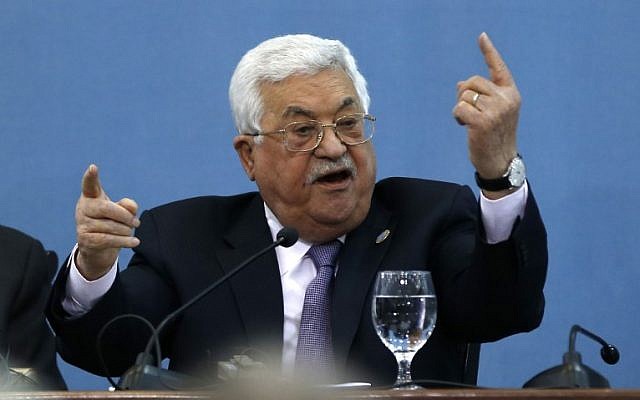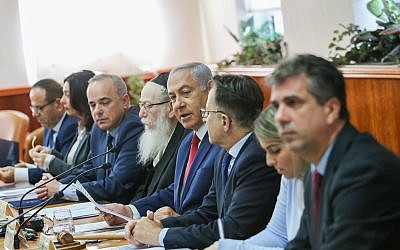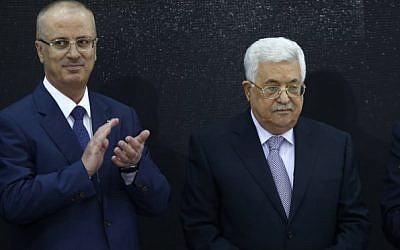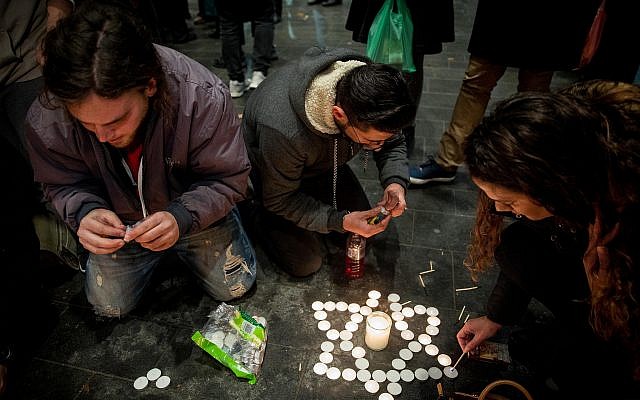Abbas’s spokesman says attempts to harm livelihood of ‘imprisoned heroes’ won’t be accepted, warns of repercussions against Israel

A spokesman for Palestinian Authority President Mahmoud Abbas denounced Israel’s decision to cut half a billion shekels in funds over its payments to security prisoners and their families Sunday.
Nabil Abu Rudeineh called the decision to implement the law “piracy of the Palestinian people’s money.”

Abu Rudeinah warned that the decision would have serious repercussions and would be placed at the top of the agenda when the PA leadership meets in the coming days.
“We consider this arbitrary Israeli decision to be a one-sided blow to the signed agreements, including the Paris Protocols,” he said, referring to an annex of the Oslo Accords that defines Israel and the PA’s economic relations.
Earlier Sunday, the security cabinet approved the implementation of a law to cut NIS 502,697,000 ($138 million) from the PA, over its payments to terrorists and their families.
Applying the law has faced opposition from the security establishment, who worry it could destabilize the situation in the West Bank. Some analysts have predicted that it may also lead to a further deterioration of the humanitarian situation in the Gaza Strip should Abbas cut funds to the coastal enclave in order to continue paying security prisoners.
Abu Rudeineh said the move would not keep the Palestinians from supporting “imprisoned heroes” or the families of those killed while carrying out attacks.
Acting PA Prime Minister Rami Hamdallah said Israel’s cutting of PA funds is “a part of a plan to destroy the National Authority and deny it the ability to continue to provide services and fulfill its commitments to its citizens.”
“Cutting the maqasa funds puts the Palestinian economy in danger and threatens our ability to pay employees’ salaries on time,” he added, using the Arabic term that refers to the taxes that Israel collects on behalf of the PA and then transfers back to Ramallah.

“We are ready for all the scenarios if the Israeli government actually implements its threats,” Hamdallah said.
Israel collects around $127 million a month in customs duties levied on goods destined for Palestinian markets that transit through Israeli ports, and then transfers the money to the PA.
The $138 million will likely be deducted incrementally over a 12-month period, according to local media reports.
The law withholding the tax revenues, passed by the Knesset last year, is opposed by Israeli security officials who say further cuts to the PA budget could hurt security cooperation and destabilize the West Bank.
The government has refused to implement the measure, though politicians have faced public pressure to crack down on the PA’s payments, which are viewed as incentivizing terror attacks.

Netanyahu, who is seeking reelection this April, has come under increasing pressure to act in the wake of the brutal murder of an Israeli teen in a terrorist attack earlier this month.
Last week, he told ministers that he would deduct the payments immediately after he received permission from the security cabinet.
A West Bank-based Palestinian man, Arafat Irfayia, 29, was arrested the day after the body of 19-year-old Ori Ansbacher was found in a southern Jerusalem wood on February 7.
The case has sparked outrage across the country. Irfayia, who reenacted the events for investigators, claimed he murdered Ansbacher for Palestinian nationalistic reasons; however, Israel’s Shin Bet security agency said that during interrogation he admitted also raping Ansbacher.
As reported by The Times of Israel
